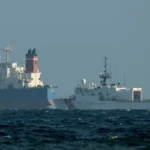
Sunday’s elections in the eastern states (Länder) of Saxony and Thuringia showed unprecedented levels of support for the right-wing populist Alternative for Germany (AfD) party, as well as a strong showing for the new ‘left-conservative’ party, the Sahra Wagenknecht Alliance (BSW).
In a major historic breakthrough, a far-right party has finished first in a state election in post-war Germany. In Thuringia, the AfD received almost a third of the vote, followed by the center-right Christian Democrats (CDU) with about a quarter, and the BSW in third place with almost 16 percent.
Before these elections, Thuringia was the only state government led by the post-communist party Die Linke (Left), whose support had fallen to 13%. In Saxony, the CDU, which has led the state government since reunification, retained its position in first place, but by a narrow margin. The CDU won 32% of the vote to the AfD’s 30.6%, with the BSW in third place with 11.3% and the SPD with 7.3%.
In both states, the CDU remains the champion of the traditional national parties. Their state leaders – incumbent Minister-President Michael Kretschmer in Saxony and party chairman Mario Voigt in Thuringia – have already started coalition negotiations, which will exclude the AfD in both cases. Another historic outcome of these elections is the likely inclusion of the BSW – a party formed only eight months ago – as a member of a governing coalition in these two states.
Kretschmer expressed confidence that a coalition of the CDU with the BSW and the SPD could be quickly formed in Saxony, where these three parties together will have the majority of seats. The situation in Thuringia is more uncertain. There, the AfD leader is Björn Höcke, who is considered the most radical wing of the AfD. The AfD organizations in Saxony and Thuringia are under legal investigation on suspicion of promoting anti-constitutional extremism. Höcke was convicted and fined for intentionally adopting a Nazi slogan at a rally.
CDU leader Voigt in Thuringia hopes to bring the BSW, SPD and Greens into a coalition, but these four parties together would not achieve a majority. At the national level, the CDU has long vowed never to govern with Die Linke, but it will have to reach some kind of cooperative arrangement with that party in Thuringia to be able to govern without the AfD. The incumbent governor, Bodo Ramelow of Die Linke, is a relative moderate and has recently governed with a minority coalition.
However, this solution is inherently fragile. A coalition composed of parties with strongly divergent policy preferences risks failing to provide coherent leadership and thus failing to attract support away from the AfD.
The elections confirmed the sharp decline of all three parties in the national governing coalition: the SPD, the Greens and the Free Democrats (FDP). The Greens fell substantially in Saxony, where they were in the CDU-led governing coalition. They failed to win seats in Thuringia. The SPD passed the 5 percent threshold for winning seats in both elections, but showed a sharp decline from previous levels of support. The FDP won no seats in either race.
Both the AfD and the BSW are characterized as populists, one on the right and the other on the left. The central issues in order of priority for the AfD are immigration, the economy and Ukraine. The BSW’s anti-war stance on Ukraine is its most insistent political theme, followed by the weak economy, which is largely attributed to the war. This argument has been a source of strength for the BSW in Thuringia and Saxony, where polls have long shown caution against escalation and support for opening negotiations to end the war.
While it would be an exaggeration to characterize these elections as dominated by the Ukraine issue, this issue was unusually prominent, not least because of the energetic personal involvement of BSW national leader Sahra Wagenknecht in both campaigns. Politico called these elections a pro-Putin “coup.”
Long-standing concerns among some voters about irregular immigration also shaped these elections, benefiting the AfD in particular. A knife attack that killed three people at a festival in the northwestern German city of Solingen on August 23 brought immigration policy back into the public spotlight. The alleged perpetrator is a 26-year-old Syrian whose asylum claim had been rejected.
While not as inflammatory as the AfD, the BSW has also raised concerns about immigration, marking a sharp break with the stance taken by Wagenknecht’s former party, Die Linke.
The public and media reaction to these election results has ranged from interpreting them as an exclusively Eastern phenomenon to interpreting them as a harbinger of destabilization not confined to the former East Germany (GDR). To put these elections in perspective, Saxony has a population of 4 million, while Thuringia is home to 2 million people. Germany’s population is nearly 84 million. The elections in Brandenburg—another Eastern state—are likely to deepen the same anxieties.
Many commentators attribute these remarkable election results to the former GDR’s distinct political culture, driven by disillusionment with the social and economic effects of reunification. Both the AfD and the BSW’s vote share is considerably higher than their position in national polls, at around 18% and 8% respectively.
However, it would not be wrong to assume that AfD and BSW will reshape election results in other parts of Germany. The dominance of the established centre-left parties (SPD and Greens), centre-right CDU-CSU and the liberal Free Democrats is deteriorating, and this trend is not confined to the eastern states.
The growing strength of the AfD and the BSW will complicate coalition formation after the national elections in October next year. The CDU is clearly the strongest party, with a vote share of just over 30 percent, but the weakness of the SPD, Greens and FDP will make it difficult for the AfD to continue its isolation even if the BSW enters a national government coalition.
The BSW could also step up its demand to cease military support for Ukraine and its opposition to the proposal to station US medium-range missiles on German territory.
Source: https://www.ocafezinho.com/2024/09/03/crescimento-populista-na-alemanha-e-alimentado-por-guerra-e-crise-economica/

